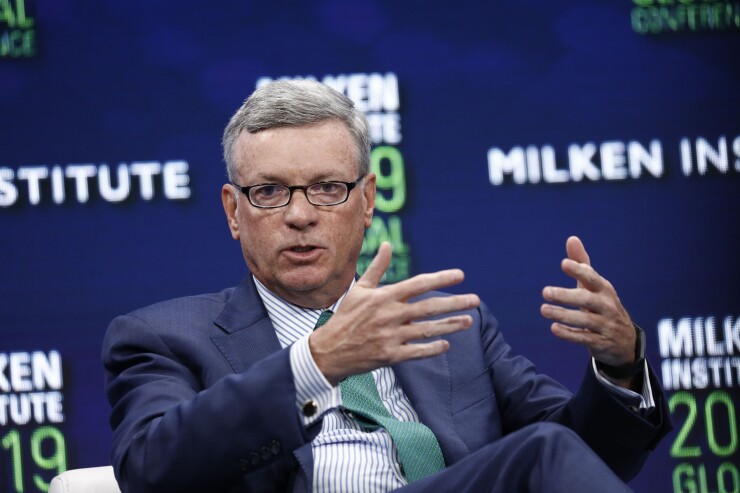Visa reported robust results for the most recent quarter, with strength in goods and travel spending, but the company is also looking to further diversify its revenue sources to offset the risks of a potential economic downturn.
"Right now, we are seeing nothing but stability," Al Kelly, Visa's CEO, told analysts Tuesday during a conference call to discuss the results of the quarter that ended Sept. 30.
Visa reported revenue of $7.8 billion for the most recent quarter, up 19% from $6.5 billion a year earlier. Payment volume was $2.93 trillion, up from $2.8 trillion a year earlier. Visa's net income for the quarter was $3.9 billion, up 8% from $3.6 billion a year earlier.
But with slight slowing in post-pandemic spending and forecasters predicting a recession, Visa is staying on its toes and planning to ramp up growth in its Visa Debit and cross-border payment operations.

"While there's stability, the reality is we do know that there are some changes in consumer behavior going on," Kelly told analysts, before outlining plans to build on some of Visa's fastest-growing payments channels.
"We see new [payment] flows as a way to drive additional volumes and transactions and value-added services as a way to drive additional yield on existing volumes and transactions," Kelly said.
Visa plans to continue to act as an enabler for startups, but the company sees the biggest opportunity in building on a recent growth surge of Visa Direct, the company's global direct-debit payments services that operates in near-real time. Debit transaction volume tends to be more resilient than credit during downturns, Kelly noted.
Visa Direct activity increased 36% over the last year, reaching 5.9 billion transactions, with steadily increasing momentum. During the most recent quarter, Visa Direct grew 42%, up seven points from the prior quarter, reaching 1.7 billion transactions, Kelly said.
Over the next year Visa plans to continue to push Visa Direct's use for payouts to drivers, delivery services and marketplace sellers. It also plans to promote Visa Direct for cross-border payments in new geographies, Kelly said.
Contactless payments, which expanded during the pandemic, also continue to play a key role in driving payment volume, Kelly said. More than half, or 54%, of Visa's global in-store transactions over the last year were contactless, up 10% from the prior year, while contactless transactions on global transit systems rose 70%.
In the U.S., contactless payments account for 28% of all transactions, recently surpassing the U.K. in total contactless transactions.
"This is nearly double the number of [contactless] transactions from last year," Kelly said.
Visa is not worried about an immediate impact from the
"Obviously, we'll have to wait and see the pace at which the second network is enabled on cards for e-commerce transactions," Vasant Prabhu, Visa's chief financial officer, told analysts. He expects any effects of merchants switching away from Visa rails for e-commerce transactions would be minimal for at least the next year.
Kelly added that since the Durbin amendment to the Dodd-Frank Act went into effect a decade ago — giving merchants an option to choose a lower-cost debit network for in-store transactions — a "good amount" of merchants continued to route transactions on Visa's rails "because of the security and fraud capabilities we have."
Visa is making incremental headway in building out its Visa Installments buy now/pay later offering, particularly in Canada, where it added large merchants such as Canada Computers, Kelly said.
To err on the side of caution in case of economic disruption, Visa plans to moderate its expense growth for the next year, Prabhu said.
"We don't know when there'll be a recession or if there will be a recession," Prabhu said, noting that Visa already has planned to slow its expense growth to the "high end of mid-single digits."
In summary, Prabhu said Visa expects stable conditions for the next four quarters, with plenty of opportunity for digitizing cash payments across the board.
"As you lap a stronger recovery from travel last year, there'll be some sequential slowdown," he said.
In a Tuesday note to investors, equity analysts at Jefferies said they were encouraged by Visa's domestic and cross-border payments recovery, noting that they "take comfort in management's commitment to use expenses as a buffer against any top-line slippage."






